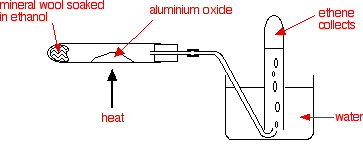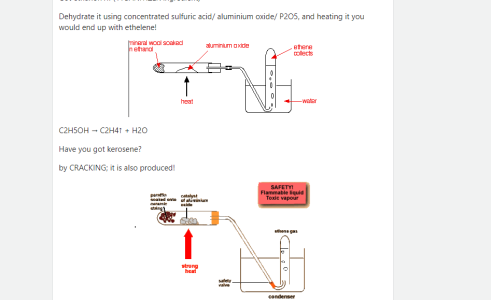Ethylene
- Stimulates and regulates fruit ripening
- Induces seed germination
- Stimulates leaf senescence
- Induces leaf abscission
- Helps plants survive low oxygen situations eg. flooding
- Stress response, particularly to salinity
- Increases petiole and internode length
- Sex determination
- Female flower development
Ethylene or Ethene is a gaseous, flammable hydrocarbon that is
hugely versatile and widely used in the chemical industry. Indeed, its production exceeds that of any other organic compound in the world, and much of this production is destined to making polyethylene, one of today's most widely used plastics.
Ethylene occurs naturally through the breakdown of methylene and is produced in all parts of the plant, particularly in cells undergoing senescence and in ripening fruit. Its action counteracts the effect of auxin and is what triggers the ageing process in plants. Its main effects are to
promote senescence and the ripening of fruit. It also increases petiole length and internode distance. Ethylene plays a part in
breaking seed dormancy and
promoting germination.
As fruits like these bananas ripen, they produce ethylene.
The balance between auxin and ethylene has an important role to play in
leaf abscission at the end of the growing season when the
cold weather triggers ethylene production at the same time as auxin levels are reducing within the ageing leaf.
Ethylene is key to
sexual expression in many plants, cannabis included, with female flowers requiring much more ethylene to develop than male flowers. By applying
ethylene-inhibiting agents such as STS (Sliver Tiosulphate) we can induce male flowers on female plants to create
feminised seeds.
It is highly valued in commercial agriculture, where it is
employed on a huge scale to ripen fruit that by necessity must be picked early to ensure damage-free transport. In these massive commercial ripening operations, ethanol is converted to ethylene and pumped in to ripen fruit, but man has used the ripening effect of ethylene at least since ancient Egyptian times when they would cut figs to ripen them, as
ethylene production is stimulated by physical damage. This is the reason that we enclose fruit in a paper bag to accelerate ripening, or that fruit will ripen more quickly if we add a mature apple or banana to our fruit bowl.
On the other hand, the ethylene naturally produced by fruit can also cause problems in the transport and storage of fruit, dramatically reducing shelf life and leading to losses due to spoiled produce. Indeed, this phenomenon is the origin of the phrase
"one bad apple can spoil the whole bunch".
I like this; Ethylene plays a part in
breaking seed dormancy and
promoting germination.
Any help germinating is a good thing.





